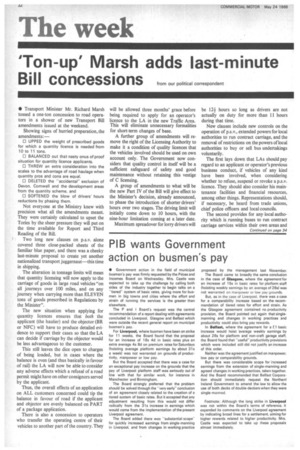'Ton-up' Marsh adds last-minute
Page 34

If you've noticed an error in this article please click here to report it so we can fix it.
Billconcessions from our political correspondent
• Transport Minister Mr. Richard Marsh tossed a one-ton concession to road operators in a shower of new Transport Bill amendments issued at the weekend.
Showing signs of hurried preparation, the amendments:
O UPPED the weight of prescribed goods for which a quantity licence is needed from 10 to 11 tons.
CI BALANCED out that nasty onus of proof situation for quantity licence applicants.
O THREW an extra consideration into the scales to the advantage of road haulage when quantity pros and cons are equal.
LI DELETED the "accidental" exclusion of Devon, Cornwall and the development areas from the quantity scheme, and
O SOFTENED the blow of drivers' hours reductions by phasing them.
Not everyone at the Ministry knew with precision what all the amendments meant. They were certainly calculated to upset the Tones by the sheer pressure they will put on the time available for Report and Third Reading of the Bill.
Two long new clauses on p.s.v. alone covered three close-packed sheets of the familiar blue paper, and there was a cheeky last-minute proposal to create yet another nationalized transport juggernaut—this time in shipping.
The alteration in tonnage limits will mean that quantity licensing will now apply to the carriage of goods in large road vehicles "on all journeys over 100 miles, and on any journey when carrying more than ELEVEN tons of goods prescribed in Regulations by the Minister".
The new situation when applying for quantity licences ensures that both the applicant (the haulier) and the objector (BR or NFC) will have to produce detailed evidence to support their cases so that the LA can decide if carriage by the objector would be less advantageous to the customer.
This still leaves the dice open to charges of being loaded, but in cases where the balance is even (and thus basically in favour of rail) the LA will now be able to consider any adverse effects which a refusal of a road permit might have on other consignors served by the applicant.
Thus, the overall effects of an application on ALL customers concerned could tip the balance in favour of road if the applicant and objector are evenly balanced on PART of a package application.
There is also a concession to operators who transfer the operating centre of their vehicles to another part of the country. They will be allowed three months' grace before being required to apply for an operator's licence to the LA in the new Traffic Area. This will eliminate unnecessary formalities for short-term changes of base.
A further group of amendments will remove the right of the Licensing Authority to make it a condition of quality licences that the vehicles involved should be used on own account only. The Government now considers that quality control in itself will be a sufficient safeguard of safety and good maintenance without retaining this vestige of C licensing.
A group of amendments to what will be the new Part IV of the Bill will give effect to the Minister's decision, already announced, to phase the introduction of shorter drivers' hours over two stages. The driving limit will initially come down to 10 hours, with the nine-hour limitation coming at a later date.
Maximum spreadover for lorry drivers will be 12+ hours so long as drivers are not actually on duty for more than 11 hours during that time.
New clauses include new controls on the operation of p.s.v., extended powers for local authorities to run contract carriage, and the removal of restrictions on the powers of local authorities to buy or sell bus undertakings voluntarily.
The first lays down that LAs should pay regard to an applicant or operator's previous business conduct, if vehicles of any kind have been involved, when considering whether to refuse, suspend or revoke a p.s.v. licence. They should also consider his maintenance facilities and financial resources, among other things. Representations should, if necessary, be heard from trade unions, chief police officers and local councils.
The second provides for any local authority which is running buses to run contract carriage services within their own areas and
Continued on page 34








































































































































